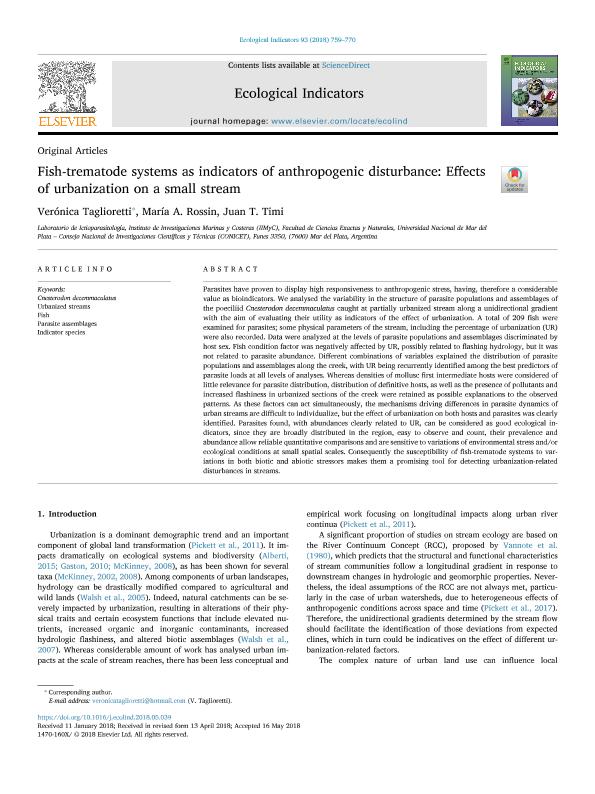Mostrar el registro sencillo del ítem
dc.contributor.author
Taglioretti, Verónica

dc.contributor.author
Rossin, Maria Alejandra

dc.contributor.author
Timi, Juan Tomas

dc.date.available
2019-11-27T13:40:51Z
dc.date.issued
2018-10
dc.identifier.citation
Taglioretti, Verónica; Rossin, Maria Alejandra; Timi, Juan Tomas; Fish-trematode systems as indicators of anthropogenic disturbance: Effects of urbanization on a small stream; Elsevier Science; Ecological Indicators; 93; 10-2018; 759-770
dc.identifier.issn
1470-160X
dc.identifier.uri
http://hdl.handle.net/11336/90625
dc.description.abstract
Parasites have proven to display high responsiveness to anthropogenic stress, having, therefore a considerable value as bioindicators. We analysed the variability in the structure of parasite populations and assemblages of the poeciliid Cnesterodon decemmaculatus caught at partially urbanized stream along a unidirectional gradient with the aim of evaluating their utility as indicators of the effect of urbanization. A total of 209 fish were examined for parasites; some physical parameters of the stream, including the percentage of urbanization (UR) were also recorded. Data were analyzed at the levels of parasite populations and assemblages discriminated by host sex. Fish condition factor was negatively affected by UR, possibly related to flashing hydrology, but it was not related to parasite abundance. Different combinations of variables explained the distribution of parasite populations and assemblages along the creek, with UR being recurrently identified among the best predictors of parasite loads at all levels of analyses. Whereas densities of mollusc first intermediate hosts were considered of little relevance for parasite distribution, distribution of definitive hosts, as well as the presence of pollutants and increased flashiness in urbanized sections of the creek were retained as possible explanations to the observed patterns. As these factors can act simultaneously, the mechanisms driving differences in parasite dynamics of urban streams are difficult to individualize, but the effect of urbanization on both hosts and parasites was clearly identified. Parasites found, with abundances clearly related to UR, can be considered as good ecological indicators, since they are broadly distributed in the region, easy to observe and count, their prevalence and abundance allow reliable quantitative comparisons and are sensitive to variations of environmental stress and/or ecological conditions at small spatial scales. Consequently the susceptibility of fish-trematode systems to variations in both biotic and abiotic stressors makes them a promising tool for detecting urbanization-related disturbances in streams.
dc.format
application/pdf
dc.language.iso
eng
dc.publisher
Elsevier Science

dc.rights
info:eu-repo/semantics/openAccess
dc.rights.uri
https://creativecommons.org/licenses/by-nc-nd/2.5/ar/
dc.subject
Cnesterodon dcemmaculatus
dc.subject
URBANIZED STREAMS
dc.subject
PARASITE ASSEMBLAGES
dc.subject
INDICATOR SPECIES
dc.subject.classification
Ecología

dc.subject.classification
Ciencias Biológicas

dc.subject.classification
CIENCIAS NATURALES Y EXACTAS

dc.title
Fish-trematode systems as indicators of anthropogenic disturbance: Effects of urbanization on a small stream
dc.type
info:eu-repo/semantics/article
dc.type
info:ar-repo/semantics/artículo
dc.type
info:eu-repo/semantics/publishedVersion
dc.date.updated
2019-10-24T19:11:07Z
dc.identifier.eissn
1872-7034
dc.journal.volume
93
dc.journal.pagination
759-770
dc.journal.pais
Países Bajos

dc.journal.ciudad
Amsterdam
dc.description.fil
Fil: Taglioretti, Verónica. Consejo Nacional de Investigaciones Científicas y Técnicas. Centro Científico Tecnológico Conicet - Mar del Plata. Instituto de Investigaciones Marinas y Costeras. Universidad Nacional de Mar del Plata. Facultad de Ciencias Exactas y Naturales. Instituto de Investigaciones Marinas y Costeras; Argentina
dc.description.fil
Fil: Rossin, Maria Alejandra. Consejo Nacional de Investigaciones Científicas y Técnicas. Centro Científico Tecnológico Conicet - Mar del Plata. Instituto de Investigaciones Marinas y Costeras. Universidad Nacional de Mar del Plata. Facultad de Ciencias Exactas y Naturales. Instituto de Investigaciones Marinas y Costeras; Argentina
dc.description.fil
Fil: Timi, Juan Tomas. Consejo Nacional de Investigaciones Científicas y Técnicas. Centro Científico Tecnológico Conicet - Mar del Plata. Instituto de Investigaciones Marinas y Costeras. Universidad Nacional de Mar del Plata. Facultad de Ciencias Exactas y Naturales. Instituto de Investigaciones Marinas y Costeras; Argentina
dc.journal.title
Ecological Indicators

dc.relation.alternativeid
info:eu-repo/semantics/altIdentifier/url/https://www.sciencedirect.com/science/article/abs/pii/S1470160X18303807
dc.relation.alternativeid
info:eu-repo/semantics/altIdentifier/doi/https://doi.org/10.1016/j.ecolind.2018.05.039
Archivos asociados
